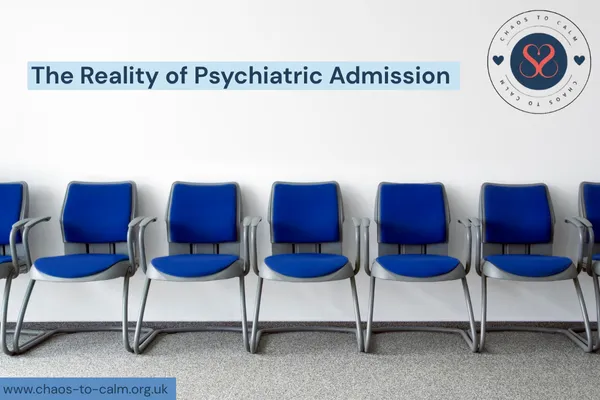
Why Psychiatric Admissions Feel So Hard – Parent Guide
Learning in the Storm: Why Psychiatric Admissions Feel So Hard

Understanding the process doesn’t make it easier, but it helps you feel less lost.
Content warning: mentions of psychiatric admission and self-harm.
When Sydni was admitted to the assessment centre for the first time, I realised something: nobody tells you how this actually works. You’re left piecing it together in the waiting room, buzzing through locked doors, trying to stay calm while your world tilts.
Today’s blog isn’t about the emotional story (though that runs underneath everything). It’s about the learning I wish someone had handed me before we walked in there.
1. An assessment centre is not a hospital ward
I thought we were heading into something like a hospital, nurses, consultants, therapy on tap. The truth is, it’s closer to respite. There is a consultant psychiatrist, yes, but no psychologist. Care is held together by mental health nurses, healthcare assistants, and activity co-ordinators. They keep your loved one safe, stabilise medication, and monitor risk, but don’t expect any therapy or answers in those first days.
Learning: It’s a holding place, not a solution. That sounds bleak, but it helped me manage my expectations.
2. You still have to advocate! Hard!
I thought once Sydni was admitted, someone else would take over. Wrong. We had to push for her to have an ensuite because of her trauma-related needs. We had to keep reminding staff about her health background. You can’t just hand your child over and trust the system blindly, you stay their voice, even when you’re bone-tired.
Learning: Keep notes, ask questions, and don’t apologise for pushing.
3. Bring the comforts, because they don’t
They don’t hand out blankets, puzzles, or comfort packs. You bring them. We arrived with crafts (diamond art, colouring, wordsearches), blankets, and small comforts. In crisis, those were more powerful than any medication.
Learning: Pack like you’re creating a calm kit, it can make the unbearable hours a fraction more bearable.
4. Nights are the hardest
Self-harm doesn’t stop at admission. For Sydni, nights are still when distress peaks. The staff do their best, but the urge doesn’t disappear behind a locked door. Knowing this changed the way I checked in and the kind of questions I asked staff.
Learning: Ask specifically about night plans, how often they’re checked, who responds if they’re in crisis.
5. Tiny wins count
In the early days, “progress” might be your child eating a snack, staying in the building, or sitting with another inpatient. It doesn’t look like recovery. But it is survival, and that matters.
Learning: Don’t dismiss small steps. They’re the foundation.
Final thought
Psychiatric admission is not the neat fix people imagine. It’s messy, frustrating, and sometimes feels like the system is patched together with tape. But knowing what it actually looks like on the ground , who’s there, what they do, what you need to bring, and how to advocate, can stop you feeling quite so lost.
And when you’re a parent standing in that waiting room, buzzing through locked doors, “less lost” is sometimes the best you can ask for.
Your calm in the chaos,
Sami xx
